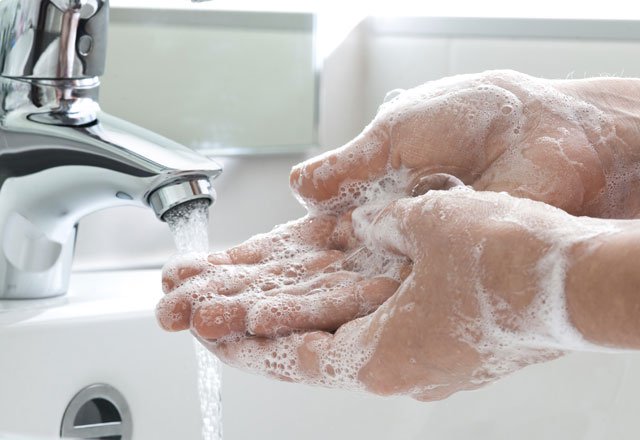 Let’s admit this right up front – this is a delicate subject. And there may be awkward moments. But we’ll make it through them. OK?
Let’s admit this right up front – this is a delicate subject. And there may be awkward moments. But we’ll make it through them. OK?
The truth is, cleanliness, both personal and generally in the office, is one of the top things people complain about when it comes to their coworkers. We don’t like it when things smell bad or are sticky and messy, or growing mold in the refrigerator. Why would anyone? Just one bad apple can spoil everything, so imagine if everyone took a lackadaisical approach. The compound effect of foul smells would have everyone running for the door!
But, bad hygiene is one of the most sensitive topics to bring up with your coworkers. As a manager, dealing with this unfortunate problem is a difficult but necessary conversation. As an employee, you must always be aware of your own habits and how they affect your coworkers. It’s not just polite – it’s better for your career and good for business.
Click here to send us your resume. Our placement service is always free for job seekers.
So what should you do?
- Encourage a clean workplace. On a company-wide level, policy and procedure should encourage cleanliness in cubicles and personal habits. Have a policy about labeling and dating food in the fridge, and when it all gets thrown out (i.e., 1st and 3rd Fridays). If you don’t employ a cleaning service, take turns with the fridge, the microwave, and any other housekeeping chores. Take time once a month and have everyone clean their cube. Have a clear dress code policy so people know what is and isn’t appropriate, like stained or unwashed clothes.
- Be personally responsible and vigilant. Being clean in the workplace requires a disciplined and sustained effort. As I wrote this, I noticed and cleaned up some poppy seeds left on my desk from a bagel that I had for breakfast. Wouldn’t want to ignore my own advice! The point is that no one intentionally sets out to be dirty, but we’re busy and distracted and it’s easy to forget or overlook things. DON’T!
- Maintain an orderly cubicle, desk or office. Make sure non-essential paper isn’t piling up on your desk. That goes double for coffee cups or soda cans. Devise a recycling system office wide, a daily one for yourself, or throw it away. Always clean up after you eat at your desk and keep your area dust and debris free with cleaning wipes. TIP: Throw any food waste or smelly wrappers in a kitchen or common area trash can, not at your desk where the smell can linger and spread.
- Keep common areas clean. When you use the microwave, wipe it out afterwards. If you spill sugar or drip coffee at the coffee maker, clean it up. It’s just that simple. Don’t forget your food in the fridge until it turns into a science experiment. Don’t be the bad coworker. Recognize that cleanliness starts with you. Clean up after yourself.
- Remember that personal hygiene matters. clean clothes, showering, using deodorant, breath mints – all basic hygiene and yet people don’t always manage to do it. Sometimes there may be a real problem underlying a person’s bad hygiene (a mental or health issue) but often it is just misunderstanding or miscalculation. You can’t skip a shower after a workout and return to the office. You can’t wear that sweater a third time before it goes to the dry cleaner. Brush your hair in the bathroom, not at your desk. Yes, you need to use deodorant too, not everyone appreciates the “natural human smell.” Just because it doesn’t bother you, doesn’t make it right. You must be considerate when you work with others.
- What smells good is a matter of opinion. You may think that your perfume is divine, to someone else it is awful. The bouillabaisse you have left over from last night might smell appetizing to some and nauseate others. It may not seem fair but we don’t live in a bubble. We share space, and in order to share successfully, we must be aware of smell and expose our coworkers judiciously. Don’t wear too much perfume or aftershave, and maybe reheat tomato soup or chicken and broccoli with ziti rather than leftover garlic shrimp or fish. Even smells considered pleasant can overwhelm a small-sized office space in a negative way.
If we all followed these guidelines, everything would be perfect. But we don’t live in a perfect world, so unfortunately, as a manager of people, or if you work in HR, you may find yourself needing to have a difficult conversation. How do you do it?
First, wait until the end of the day to speak with the employee. Make sure to speak to them privately in a conference room, office, or off to the side where no one can see or hear. Be firm but be careful in your choice of words. It is important that they understand that their habits are affecting the whole office but there is no need to be mean or disrespectful. Reassure them of the good things they are doing and stress that this is simply an area they need to work on.
In the end, an ounce of prevention is worth a pound of cure. If we all remember that being a good coworker starts with each of us, we would all have great coworkers. Strive to be the good coworker that you want others to be. We guarantee that those around you will appreciate you more because of it, and you will appreciate them as they do it too.
Stay clean everyone!
Click here to send us your resume. Our placement service is always free for job seekers.
